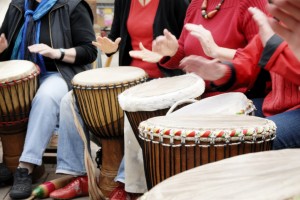[ad_1]
This blog describes one group member’s experiences in a weekly music therapy session, held in an NHS care home in Scotland. Morna* is a 74 year old woman living with a mixed-type dementia and attends the music therapy group regularly.
When I arrive, Morna is sitting with some others in a communal space within the care home. The room is quiet, with little explicit interaction between Morna and those around her. I approach Morna and kneel by her side; “Good Morning Morna”. Looking up, Morna smiles and begins to laugh “Oh no!” she exclaims in a jocular tone. I smile “It’s time for our group music therapy session Morna, would you like to stay and join in today?” – “Oh yes!” she replies.
The session starts with a welcome song. Each group member is greeted through music and offered space and opportunity to familiarise themselves with their chosen instrument. We move into our ‘creative space’ and each member introduces themselves musically to the group.
“Hello Morna” I sing; “It’s nice to be with you – you can play your woodblocks, and we can listen to you groove!”
Morna, recognising the songs’ structure and melody, hums in unison as she is welcomed. Needing little encouragement, Morna grasps her opportunity and begins to play her tuned percussion freely and playfully, laughing as she explores the instrument. I attune to her musical expression as she plays, mirroring her rhythm and matching the tonal centre of her playing. Morna laughs as we make music together, moving her shoulders and tapping her feet as we co-create our improvisational ‘jam’ – it feels new, exciting and draws us together in the ‘here and now’.
As our session progresses, the group explores a combination of familiar, pre-composed songs alongside opportunities for less structured, improvisational moments. Morna moves between active music making, playing and singing in unison with others, and more receptive engagement. In her quieter moments, Morna appears reflective, using song themes and lyrical content as catalysts for memory forming and sharing her life story.
After the song ‘Nobody’s Child’ by Hank Snow, Morna reflects on her own childhood, and her experience of being the only girl amongst many brothers, expressing a sense of feeling isolated: “I’m nobody’s child” Morna repeats. Rather than distract, or deflect, Morna’s emotional state is held and validated; I mark the importance of feeling connected to others, feeling included, seen and heard by those around us – the importance of feeling ‘part of something’. I mark how Morna is very much ‘a part of’ our group – that here, she is seen and heard. This sentiment is repeated by a fellow group member “Aye, you’re one of the band!”
After a group rendition of ‘Daydream Believer’ by the Monkees, Morna tucks her hands under her armpits and purses her lips, playfully mimicking a monkey. The group erupts in laughter as she exaggerates her movements in response. Morna’s gestures appear to enlighten a memory for her, as she pauses, and drops her hands to her sides. “It’s like him, the wee…you know? With the…”
Morna is trying to convey something to the group, though aphasic qualities of her dementia make this a struggle, and her words shift to short, staccato vocalisations. I match the tempo and dynamic qualities of these with percussive taps on the body of my guitar. I gradually begin to vocalise alongside Morna, extending the length of my vocalisations slowly and gently introducing tonal variation. As I do, Morna laughs and begins to be more playful in her vocalisation, tapping her knees and ‘scatting’ alongside me. The call and response, matching and mirroring of our vocalisations move Morna from a place of frustration to more playful way of being. She is boldly ‘doot doot dooing’ alongside other group members, who have joined in our scatting. I notice a familiar, repeated melody in Morna’s singing – I reflect this back, gradually developing a tune that I recognise to be ‘I Wanna Be Like You.’
“Jungle Book!” she exclaims – excited to have found the words she was looking for. Reaching the chorus, the group members begin to sing along. Clapping her hands as she sings, Morna laughs. Our final song choice for today is a direct result of her contributions, her inclusion. “We haven’t got a trumpet, we’ll have to do without!” I exclaim. I do my best trumpet impression and, laughing, Morna joins the ‘trumpeting’ – alight with humour and vibrancy.
Morna closes the song with a ‘trumpet crescendo’ eliciting cheers and laughter from staff and the group. Morna flops in her chair performatively, smiling at the applause. Though our session is just shy of an hour, Morna has explored a broad spectrum of experience today. Not merely having ‘attended’ the session, Morna was instrumental in creating it.
*Pseudonyms have been used to protect confidentiality
Contributor Reuben Hodkin, Music Therapist, NHS Lothian

Join us next week to hear more about the important role of music therapy at our bi-monthly AHP webinar.
Music Therapy, Care Home Teams and Dementia – AHP Dementia Webinar on 13th December 2023, 3:30 -4:30pm
Join the conversation with music therapy colleagues, sharing learning and impact of using music therapeutically in Care Home Teams; supporting relationships and wellbeing for people with dementia
Guest Presenters :
Laura Bolton – Music Therapist NHS Lothian
Hazel Stewart – Associate Quality Improvement Advisor
Kassandra E’Silva – Music Therapist, NHS Lothian
Follow the link to register:
https://attendee.gotowebinar.com/register/7938482084466921567
Joining the session contributes 60 minutes to your CPD time
ACTION After registering –you will receive a confirmation email containing information about joining the webinar.
Please ensure you have followed the information to ensure your device can connect to the Go To Webinar system before the event.
[ad_2]
Source_link


